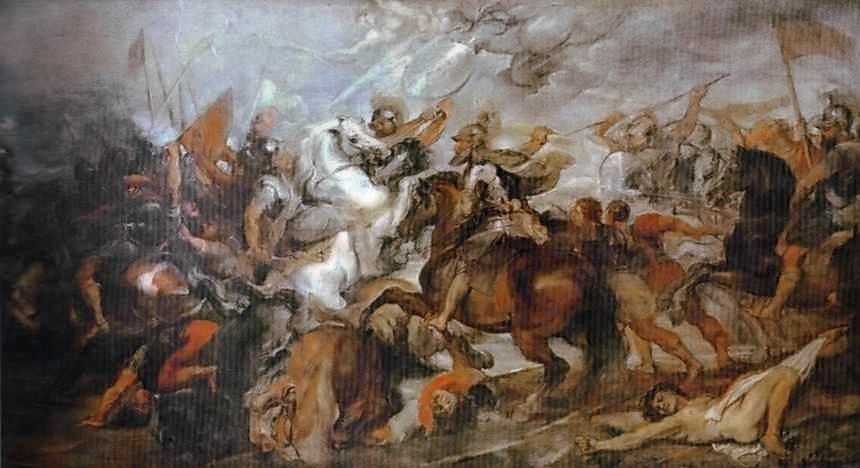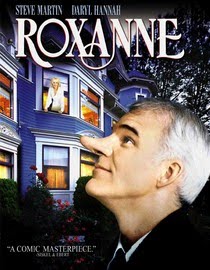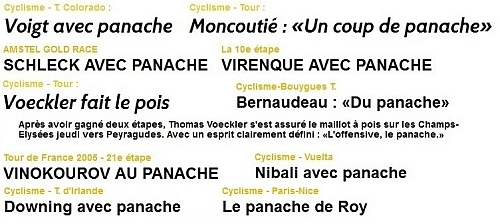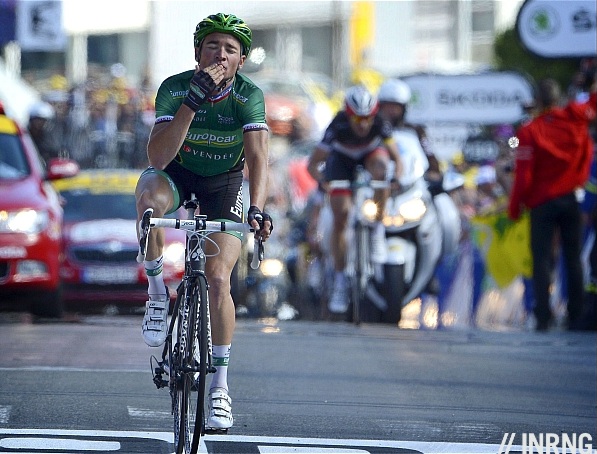Cycling borrows many French words and for many maillot jaune, peloton and other terms have been absorbed into English, just like blonde or savoir-faire. But panache is an elusive word that’s harder to define. Maybe you know it when you see it?
Typically a rider with panache is said to be one who attacks, displaying courage and flair. But the surprise factor counts and a rider who wins too often can lose this label.
But where does the word come from and what does it mean?
The pronunciation features a soft “ch”:
A panache was a plume of feathers, generally ostrich feathers, set upright and borne as a crest.
King of Panache
The first mention of panache was on a medieval battlefield. In 1590 King Henri IV was fighting through France and in the battle of Ivry found his forces outnumbered. He rallied the troops with a battle cry:
“Companions! If you today run at risk with me, I will also run at risk with you; I will be victorious or die… …If you lose your ensigns, cornets or flags, do never lose sight of my panache; you will always find it on the road to honour and victory.”
King Henri wasn’t saying “look at my style,” instead medieval knights carried feathers in their helmets for decoration and recognition and this plumage was called a panache. He was telling his troops to follow him into battle.

King Henri won the battle which was so important that it was depicted by Flemish painter Rubens, the Kristof Ramon of the medieval battlefield. Henri went on to lay siege to Paris and by force, politics and theocratic positioning eventually vanquished the Spanish-influenced Ligue and, just about, united Catholics and Protestants in France. Quel panache!

The theme of bravery against adversity was rekindled by playwright Edmond Rostand in Cyrano de Bergerac, a work that sits in the pantheon of French literature. The story has been made into several films and TV dramas – including Hollywood’s take, Roxanne, with Steve Martin and Darryl Hannah – and revolves around the brave Cyrano who has fallen for Roxanne but is too shy to approach her yet he is willing to launch into battle. A romantic but a fighter. The play’s final words are “mon panache” as Bergerac dies. Rostand has made feathery headgear into something else, from a noun to a notion. He described it students in a lecture (my translation):
“Panache is not greatness but something additional to greatness, it floats above it. It’s acrobatic, excessive and a little wild… panache is the essence of bravery. To joke when faced with danger is the highest form of politeness, a gentle refusal of tragedy; panache is the modesty of heroism.”
Rostand’s speech is lofty. Writing about Cyrano de Bergerac, Susan Lloyd suggests “the pursuit of the ideal is more important than its achievement” which might explain things in simpler terms: panache isn’t winning battles, it’s the way you fight.
So what about cycling?
That’s enough of the literary take but it’s been important to understand the term so we can explore its use in cycling. It remains an elusive phrase where a victorious king started the things but Cyrano de Bergerac dies on stage.
Cycling embraces heroism, romance and the notion of panache slots right in here. We welcome long breakaways and attempts to win against the odds. From the early days this gave journalists something to write about, the brave tales of long raids were often exaggerated to appeal to readers longing for adventure. Today television works the same, a long race needs breakaways even if they prove futile. There would be nothing to watch for starters but it’s the uncertainty that retains the audience, a coup de panache could see a rider strike clear and thwart a chasing bunch.
The obvious example is Thomas Voeckler, the man who puts the ache in panache. He’s got an awkward style on the bike and seems to shift position, like someone with chronic back pain that can’t sit tight. He doesn’t win much either although when he does, it often attracts headlines with the P-word. A search of the L’Equipe website reveals his name is linked to the word more than any other rider over the past 10 years.

It’s not just the chancers like Voeckler. Joaquim Rodriguez reminds me of a swashbuckling pirate with a knife between his teeth. Alberto Contador’s Vuelta winning ride is another example and L’Equipe pulled out the P-word to describe Tom Boonen’s Paris-Roubaix win. Or see Matteo Rabottini’s rampage on Stage 15 of the Giro.
Barging clear off the front of the bunch isn’t panache, it has to work from time to time, the rider has to surprise. A lesser rider who makes a breakaway in the Tour de France is making a huge effort but still doing their job; it’s only panache a daring move brings an unexpected result. A loser can have panache only long as they succeed from time to time. Win too often and the rider doesn’t have panache because they simply end up meeting expectations, they don’t beat the odds they merely confirm them. If Contador had held the lead in the Vuelta from the start to finish he could not have displayed the daring needed to excite the riders. Now the feat of leading a stage race for so long is impressive but it’s not so exciting, the contradiction where excellence might not excite. In the current edition of Rouleur Magazine Cath Wiggins gives her thoughts on the topic:
“All this panache business – they can kiss my arse, these people. Who’s got panache? These people that go on stupid pointless attacks? I don’t like panache.“
It’s here we go back to Cyrano de Bergerac and idealism, where the attempt is more important than result or in cycling terms where the ride matters more than the win. Perhaps Team Sky can’t do panache because they don’t hope to get lucky and win, they expect it. The team removes hot-headed romanticism, replacing it with a cool empiricism. There’s panache when Vincenzo Nibali attacks but meanwhile the Sky rider is checking his powermeter to run a mental calculation about whether to respond or simply hold the tempo. Given most attempts at panache fail, Cath Wiggins is right although a “stupid pointless attack” is quickly written up as tactical genius should the rider win.
This is not new. Sky just use tools available today that others did not have in the past. 20 years ago a calculating rider could set the pace by their heart rate monitor. Long before that a rider like Jacques Anquetil thwarted Raymond Poulidor’s plucky panache so often that it was said Anquetil was an inhuman metronome. Similarly people were stunned by Merckx’s famous 1969 Pau-Mourenx stage win in the Tour but in time his crushing domination meant Luis Ocaña’s failed efforts rhymed with panache.
Lazy
As much as the word conveys excitement what if this word was a catch-all term that you can drop into a headline when stuck for another word? Panache is wide enough to cover everything, from a fearless sprint to a long solo break or a crafty attack under the red kite. Can we file it with epic and heroic?
Panache in one line
- It started as a plume of feathers for king and was transformed by a playwright into a code of conduct that lives on today in sport
Summary
I’d heard the phrase used so many times but didn’t know where it came from. Once a bunch of feathers, panache has gone from the battlefield via playwright to the field of sport. It’s used as as praise, a ready term to describe bold riding that excites the audience with its daring embrace of risk. But should a rider win too often then the panache fades, plucked away by repetition and regularity.



seems to sum up situations where the odds are against you (but importantly there is a chance you could come out on top) but you throw all doubts aside and plunge head long into your attack without a backward glance as this may be your only hope.
I guess it’s something in shirt supply, with only the extraordinary moments worth the name.
Good quote from Cath Wiggins!
I do like the quote from Cath, but the Romantic in me still loves to see rides like Thibault Pinot in the Tour, or the closing (amazing) stages of the Vuelta this year, where there was panache painted all over the roads.
Maybe there’s some panache in her quote?
Maybe 😉
I wonder if Mrs Wiggins has bitter memories from the 2007 Tour stage 6 Semur – en – Auxois to Bourg en Bresse when hubby was swept up with only 7km to go. Up with panache and down with radio controlled racing I say.
I like the Suzie Dent element in this post
I had to look reference up… amusing given Susie Dent appears to be a lexicographer.
Great post!
A post with some panache! It was all great until you brought Cath Wiggins in the discussion. No disrespect, but she has this boorish way of answering things.
Anyways, I think Wiggo showed panache for winning the Olympic TT gold. And he would need some to win the Giro, that race can’t be won without style
I am actually really looking forward to what happens in the Giro. I think he’s got a chance, but it’ll be very tough. But with half of Italy (and Spain) against him and Sky, it should be fascinating.
The irony is, he’s got bags of panache as a person, but on the road he doesn’t often show it, though leading out sprints in the Tour was a touch, and showed a bit of gumption when he could’ve just sat in the pack.
The yellow jersey doing a serious lead out of the rainbow jersey on the final lap of the Champs Elysee? I think that is a very definition of panache! I was so excited I nearly spilled my beer.
Good post, Inner Ring.
For panache, I think the Romandie “sprint” win might be ahead as it was a greater surprise… but it’s always a personal take on things.
‘Thomas Voeckler, the man who puts the ache in panache’
good one!
Great post! Always good to learn something new.
I think in modern journalism it’s probably just another word to fill out the word count. I seen ‘panache’ as hard to define as ‘leadership’ – tricky to distil into words, but we sure know it when we see a true leader?
There are always times when the leader has to demonstrate their alpha status to the team, either during races or even on training rides – for me, that moment is panache.
NIce article!
Is that a pump on the peugeot riders seat tube? About 45secs in…
Yes, the Peugeot rider 21 seems to have a pump and a spare under the saddle.
” Rubens, the Kristof Ramon of the medieval battlefield”
Seriously? I know very well who Rubens is. Kristof Ramon, not so much.
Sorry, one is more famous worldwide and it’s a bit of a reach. But I thought about comparing how scenes were described then with the means today.
For those wanting more on Ramon, see Flickr: http://www.flickr.com/photos/14538377@N06/
Very good read, thanks!
She shouldn’t decry something that his husband doesn’t have.
I bet she wouldn’t be unhappy with titles likes “Wiggo avec Panache”.
Well, at least we know where Wiggin’s wife stands!
the up to date version and urban form of Panache is Ballsy,
Wiggo could be victorious in the Giro but he would need the high passes to be closed due to snow.
snow ballsy :))
Panache. The most recent race that embodied it for me most recently was the ride up the Stelvio in the Giro. Thomas De Gendt showed panache when held off the entire peloton up the 20-odd km up the Stelvio. And when it started to look like he was a GC threat, Hesjedal, who is not known as a climber, showed panache by taking up the chase and towing legendary attacking climbers Joaquin Rodriguez and Michele Scarponi to the finish line.
Panache.
+1 awesome display, I hope he has some ambushes in store for the Sky metronome at the Tour this year
Most educational. Thank you, inrng.
And “King Henri puts in a bold attack to take the overall lead in the Wars of Religion” made me laugh.
That was me posting.
Voeckler fait les pois? Is he taking ze peas?
A very interesting etimology!
In modern cycling use, I think panache is something that is so wonderful because it is so hard to define. It isn’t one particular thing (that would make panache synonymous for something else), but a combination of traits (some of which are opposites) including but not limited to style, flair, brazen, bold, daring, foolishness, guile, suffering, instigating, going against the odds (damn the consequences) and leadership/taking charge of a situation, etc.
Panache is a characteristic, not an act. One either has panache or they don’t. One might show signs of panache in a single instance, but they don’t attain it until they show it repeatedly. Hence Voekler, Voigt, and Vino (I can already hear the boos) clearly have panache, whereas Wiggins and Evans, despite being brilliant champions perhaps do not, even if they have on occasion shown signs of it.
I do not believe panache has anything to do with victory, but it is the extraordinary display of effort to attain it, even if it fails (the attitude that 2nd place is the first loser, but it is better to fail while trying rather than failing to try). But it is more than entry in the suicide breakaway, because these are often dictated strategies from above. These rides can be heroic, but on their own, they are not necessarily panache. Nor does it have to be unexpected; clearly we expect Voekler to be the barodeur in races that suit him.
Interesting topic, elusive definition.
Iljo Keisse’s stage 7 win in Turkey. Dramatic, but probably no panache.
Maybe Team Sky already knew the origin of the word and concluded that wearing yellow helmets would be sufficient in terms of panache for the TdF?
Showing panache is racing with the heart and emotion of a Romantic.
Best example of Panache – Vanmarcke’s slaying of the Gods at the Omloop Het Nieuwsblad this year. The youth took it to the classics hardmen and left them shaking their heads.
Best example of Anti-Panache – Gerrans sucking wheel till the last second at Milan-San Remo. Whatever.
On behalf of Aussies everywhere. Get stuffed Tom!
+1 Tom!!
But Gerrans showed consumate professionalism, tactical awareness and played it beautifully to his strengths – I know what I’d rather have….
A perfect example of Panache, with a capital P, was demonstrated during the battle of Waterloo by General Pierre Jacques Etienne Cambronne when he was asked to surrender by a British General. Depending on the witnesses, his answer was either “La Vieille Guarde meurt et ne se rend pas” ou “Merde!”. Just about then he was grievously wounded and captured. Turned out all right after all, he ended up marrying the Scottish nurse who tended him back to health.
When you think back all our favourite superstars have had Panache, Coppi, Merckx, Anquetil, Pantani etc etc The riders with panache are those who know what it is to make a race exciting who fight despite the odds being against him. In 2012 this Panache has been there but our big winners, ie Wiggo have done it the other way, grinding it out with power meters is plain old boring. Tommeke at Roubaix, Voeckler and Pinot at the Tour, De Ghent in the Giro and of course Bertos 50Km plus attack on Fuente de in the Vuelta, possibly the best show of Panache in a long time.
I’m not surprised at Cath Wiggins response, for all his brilliant year there wasn’t much panache or style on show….other than OFF the bike!!
You do have to take care of words otherwise they lose all meaning through being used lazily and incorrectly.
On the subject of lazy, my least favourite sporting phrase is ‘the X-factor’ which is pundit’s shorthand for ‘I can’t be bothered to analyse or explain why he/she is good’.
You’ve summed up very well what I wanted to say.
Another word used far too often when people can’t be bothered to find the right thing to say is ‘iconic’.
I am a fan of your blog, and as fan this was just a great, great piece. Thanks also for sharing the victory from Eddy “Half man, Half God” Merckx with us, I saw companying the riders my very first car, a Peugeot 404. With panach back in time I was.
But the actor who played Cyrano with panache was Gérard Depardieu and not Steve Martin. “My thaught” as they say in Flanders. If you are surching for a ride with panache, I lead you or anyone else of the readers trough the field of “Ronde Van Vlaanderen”, edition 2013. Keep up the good work, and thanks. It is my favourite cycling blog.
Excuse my English, but wioth some excercise it becomes better.
Nice bit, thanks. Who really cares what Wiggo’s wife thinks except Bradley? The same crap came out of the mouth of Mitt Romney’s wife recently – who expects them to be objective or cares what they think, other than their husband? To me Nibali is way up there in the panache department. I like someone who tries to win against the odds rather than races not to lose…to me that defines PANACHE. Claudio Chiappucci was another one like that in recent memory – they’re not “no-hopers” but instead talented guys who can be counted on to try even when the odds are against them. Cycling can be pretty boring when these types are not involved.
Very good piece. A few minor pedantic corrections, if I may. One is that Rubens and Henri IV didn’t live in the Middle-Ages. Henri IV and the Battle of Ivry can perhaps be adscribed to the Renaissance, and Rubens is a Baroque painter.
On the genealogy of the “panache” abstract concept, I recall having seen it employed in Flaubert’s “Bouvard et Pécuchet”, which predates “Cyrano de Bergerac” in about 20 years, and with Flaubert taking for granted what the word was supposed to mean (the meaning Mrs. Wiggins refers to). So perhaps this concept of “imposing distinction in the attitude or appearance” evolved from throughout the centuries from Henri IV’s Ivry anecdote.
Finally, as I’m one of those who should feel requested by Mrs. Wiggins to apply my lips to her backside (that I have never seen, and therefore can’t evaluate the appeal of the prospect), I must express a certain sadness, because it is especially the other sex who, I think, should best appreciate the value of, not necessarily winning, but trying to do it with distinction and splendour. If my wife was a cyclist, I’d much rather she lost Paris-Roubaix by crashing in the mud half a mile from the velodrome, after having torn the race to rags, than seeing her win by means of cunning wheel-sucking and outsprinting in the last inch. Panache might not beat calculation over the finish line, but it should at any rate beat it at being sexy.
Good things and I didn’t know the Flaubert mention.
I’ve always thought of panache as a synonym for “style.” E.g. “winning with panache” = “winning in style”. And, that it’s more often associated with winning than with gambling and loosing, though certainly I’d understand what “loosing with panache” meant.
There is also the visual component of panache (aka “style”), describing a rider who has socks just right, sunglasses over straps, etc.
Perhaps my understanding of the definition was incorrect or, at least, incomplete. Thanks for clarifying.
My Dear Taco,
My university English studies also included a discussion on ‘panache’, and yes, it is a reference to style…a reference to how ‘it’ was done! Jeremy Roy’s attack in the TDF 2010 during Stage 13, only to lose to Thor Hushovd was a demonstration in panache, as was Maxim Iglinsky’s win of Liege-Bastogne-Liege 2012. Vincenzo Nibali losing to Iglinsky, coming second, showed just as much panache!
Hellen Mirren could show panache stepping out of a battered old car, while Lady Gaga could step out of a limo and only show underwear!
Would be nice to see riders showing off some beautiful plumage in their helmets! Be interesting to see if choice of bird matches their riding style!
My Dear Taco,
Hysterical – and showing lot of panache. Thanks. Maybe some day it will even be “My Dear Mr. Taco”
Vincenzo Nibali losing to Iglinsky, coming second, showed just as much panache!
Loved watching Nibali in that race and definitely felt bad for him coming up a k or so short. But, etymologically, where does “balls” or “ballsy” or “bold” or “daring” end and “panache” start? I don’t think of them as the same, though some of the examples used in this discussion ring more of bold or opportunistic moves but not necessarily “stylish” ones, though one could necessarily imply the other.
Perhaps SKY = Noblesse Oblige, I remember once saying this to a Breton co-equiper, he having commended me on a fine ride, it caused much amusement.
What about sartorial panache? Vaughters or Elton John? 🙂
http://cheezburger.com/6897261312
It seems to me that Voeckler took over the mantle that Jacky Durand left when he retired. Celebrating being the lanterne rouge one minute and winning with a long breakaway the next.
Wend it comes to word-smithing.
We all agree, Inring has got Panache,
but Bundle is showing off!
That gear Merckx is pushing across the line! … look at Goodefroot in ‘A Sunday in Hell’, pushing a monstrous gear across the stones – that with a high-topped casquette defines panache of the era.
Powermeter watching metronomes do not have a single molecule of panache, they still win though.
Sagan has panache in our current era.
There should be points or an award or something for panache. Love it, immensely. It’s the reason I get up in the morning. Team Sky (as you mentioned) don’t have it, don’t want it, probably can’t even spell it. That’s why they’re such boring tw_ts to watch. Thankfully the world ends tonight (Mayan prophecy) so I won’t need to watch the most boring Tour in living memory (2012 version) repeat itself in 2013. However, should the ancient Mayans prove inaccurate in their forecast, I look forward to somebody, ANYBODY riding with panache next year. Automatons are so 2012.
When I saw the headline to the post, I knew Voeckler would be the picture! How he can be so disliked by so many is beyond my understanding.
Let’s not forget the panache’, the best pre,mid and post ride drink! Especially at a cafe terrace under a platane. I’v mentally followed it’s white crested head over many a col 🙂
Funny, I just saw that in the south of germany a panache’ is called a Radler, which means cyclist!!
Radios kill panache.
Give me more panache. Pan Ache (pan = all, ache = hurt)
Agree with ” GuyH & Wheelsucker ” , Wiggo confounded his wife , by leading out King Cav , on the Champs Elysee ! Definitely made the day for me , as i watching a screen opposite the finish line , surrounded by peoples of All Nationalities , when the Crowd erupted with enthusiasm !
Been in many situations such as this , over 15 seasons , but here was a Guy , not content to rest on his Laurels ! Coasting over the line has been done too many times by other winners